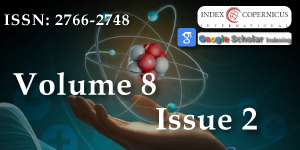Reinterpreting the Riemann Hypothesis: A Theoretical Framework Bridging Mathematics and Universal Symmetry
Main Article Content
Abstract
Mathematics, as a universal language, bridges human perception with the intricate structures of the universe. This study delves into the Riemann Hypothesis, exploring its implications for prime numbers, universal constants, and mathematical physics. Through an interdisciplinary approach involving charge, parity, and time reversal symmetry (CPT symmetry) and universal energy constructs, we propose a novel theoretical framework that reinterprets the Riemann zeta function. This framework sheds light on the symmetry and structural gaps between human mathematical constructs and the natural order, offering pathways toward a comprehensive understanding of the universe.
Article Details
Copyright (c) 2025 Safadi HH.

This work is licensed under a Creative Commons Attribution 4.0 International License.
1. Safad H. SUSY Boson and Fermion Rejoinder Most Standard Model, Periodic Table, and DNA Curiousness Yin – Adam Model. Phys Opt Sci. 2023;SRC/JPSOS/222. Available from: https://www.onlinescientificresearch.com/articles/susy-boson-and-fermionrejoinder-most-standard-model-periodic-table-and-dna-curiousnessldquoyinndash-adam-modelrdquo.pdf
2. Hershberger S. The status of supersymmetry. Symmetry Online Magazine. 2021. Available from: https://www.symmetrymagazine.org/article/the-status-of-supersymmetry?language_content_entity=und
3. Riemann B. Ueber die Anzahl der Primzahlen unter einer gegebenen Grösse. Monatsber Berl Akad. 1859. Available from: https://www.emis.de/classics/Riemann/Zeta.pdf
4. Edwards HM. Riemann's Zeta Function. Dover Publications; 2001. Available from: http://www.stat.ucla.edu/~ywu/Riemann.pdf
5. Titchmarsh EC. The Theory of the Riemann Zeta-Function. Oxford University Press; 1986. Available from: https://sites.math.rutgers.edu/~zeilberg/EM18/TitchmarshZeta.pdf
6. Ivic A. The Riemann Zeta-Function: Theory and Applications. Dover Publications. 2003.
7. Montgomery HL, Vaughan RC. Multiplicative Number Theory I: Classical Theory. Cambridge University Press. 2007. Available from: https://ndl.ethernet.edu.et/bitstream/123456789/23715/1/Hugh%20L.%20Montgomery.pdf
8. Borwein J, et al. The Riemann Hypothesis: A Resource for the Aficionado and Virtuoso Alike. Springer. 2008. Available from: https://www.amazon.in/Riemann-Hypothesis-Resource-Aficionado-Mathematics/dp/0387721258
9. Conrey JB. The Riemann Hypothesis. Notices of the AMS. 2003;50(3):341–353. Available from: https://empslocal.ex.ac.uk/people/staff/mrwatkin/zeta/conreyRH.pdf
10. Bombieri E. Problems of the Millennium: The Riemann Hypothesis. Clay Mathematics Institute. 2000. Available from: https://www.claymath.org/wp-content/uploads/2022/05/riemann.pdf
11. Luders G. Proof of the CPT Theorem. Ann Phys (N Y). 1954;2(1):1–15. Available from: http://dx.doi.org/10.1016/0003-4916(57)90032-5
12. Jost R. The General Theory of Quantized Fields. American Mathematical Society. 1957.
13. Streater RF, Wightman AS. PCT, Spin and Statistics, and All That. Princeton University Press. 1980.
14. Weinberg S. The Quantum Theory of Fields, Vol. 1: Foundations. Cambridge University Press. 1995. Available from: https://doi.org/10.1017/CBO9781139644167
15. Sakurai JJ, Napolitano J. Modern Quantum Mechanics. Pearson. 2017. Available from: https://icourse.club/uploads/files/65b4c16648d2b93f82fe3271c3381c211f2f532.pdf
16. Peskin ME, Schroeder DV. An Introduction to Quantum Field Theory. Westview Press. 1995.
17. Landau LD, Lifshitz EM. Statistical Physics. Butterworth-Heinemann. 1980. Available from: https://ia902908.us.archive.org/31/items/ost-physics-landaulifshitz-statisticalphysics/LandauLifshitz-StatisticalPhysics.pdf
18. Dirac PAM. Quantised Singularities in the Electromagnetic Field. Proc R Soc Lond A Math Phys Eng Sci. 1931;133(821):60–72. Available from: https://royalsocietypublishing.org/doi/10.1098/rspa.1931.0130
19. Einstein A. The Field Equations of Gravitation. Session of the Royal Prussian Academy of Sciences Berlin. 1915;844–847. Available from: https://www.scirp.org/(S(czeh4tfqyw2orz553k1w0r45))/reference/referencespapers?referenceid=1537594
20. Planck M. On the Law of Distribution of Energy in the Normal Spectrum. Ann Phys. 1901;4(3):553–563. Available from: https://doi.org/10.1002/andp.19013090310
21. Wheeler JA, Ford KW. Geons, Black Holes, and Quantum Foam: A Life in Physics. W.W. Norton & Company. 1998. Available from: https://www.scirp.org/reference/referencespapers?referenceid=2648898
22. Hardy GH, Littlewood JE. Contributions to the Theory of the Riemann Zeta-Function. Proc R Soc Lond. 1914. Available from: https://pracownicy.uksw.edu.pl/mwolf/Hardy_Littlewood%20zeta.pdf
23. Safadi H. Why quantum gravity will not be grasped. J Laser Opt Photonics. 2018;5. Available from: https://www.hilarispublisher.com/conference-abstracts-files/2469-410X-C3-029-009.pdf
24. Safadi HH. SUSY Perceptions Reveal Standard Model Contradictions: Gravity absence, Hierarchy problem, Antimatter Puzzle, Muon g-2 Results, Anti-down Quark domination. J Phys Opt Sci. 2021;SRC/JPSOS/155. Available from: https://www.onlinescientificresearch.com/articles/susy-perceptions-reveal-standard-model-contradictionsgravity-absence-hierarchy-problem-antimatter-puzzle-muon-g2-resultsantidown.pdf
25. Siegle E. Why You Should Doubt ‘New Physics’ From The Latest Muon g-2 Results. Forbes. 2021. Available from: https://www.forbes.com/sites/startswithabang/2021/04/08/why-you-should-doubt-newphysics-from-the-latest-muon-g-2-results/
26. Euler L. Variae observationes circa series infinitas. Comment Acad Sci Petropol. 1737. Available from: https://scholarlycommons.pacific.edu/euler-works/72/
27. Hilbert D. Mathematical Problems. Bull Am Math Soc. 1900;8(10):437–479. Available from: https://www.astro.puc.cl/~rparra/tools/PAPERS/hilbert_1900.pdf
28. Atiyah M. Elliptic Operators and Compact Groups. Springer; 1976.
29. Heisenberg W. The Uncertainty Principle. Z Phys. 1927;43(3–4):172–196. Available from: http://dx.doi.org/10.1007/BF01397280
30. Ramanujan S. The Lost Notebook and Other Unpublished Papers. Narosa Publishing House; 1988.
31. Safadi HH. How and Where the Standard Model of Particle Physics Hides Dark Matter. J Phys Opt Sci. 2020;2(1):2 of 3. Available from: https://www.onlinescientificresearch.com/articles/how-and-where-thestandard-model-of-particle-physics-hides-dark-matter.pdf

